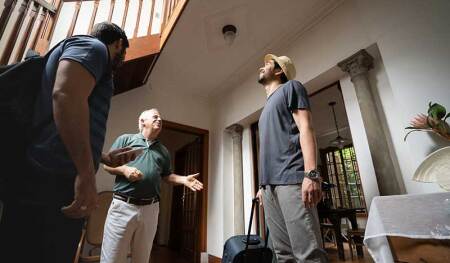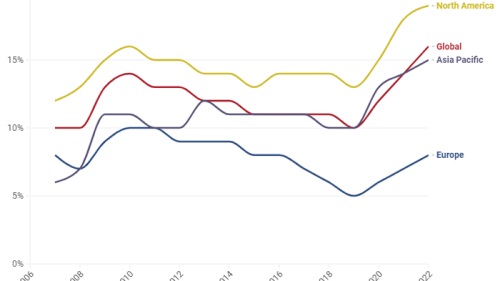This article appeared in the Fall issue of Urban Land on page 247.
For more than a decade, online hospitality marketplaces such as Airbnb, HomeAway, Vrbo, and others have disrupted the global lodging industry by offering inexpensive short-term rental (STR) accommodations.
But almost from their inception, these online marketplaces—which are not subject to the regulations and fees common among hotels—have been at loggerheads with officials and local communities who blame the firms for reducing tax revenue, causing havoc in some neighborhoods, and raising housing prices.
Municipalities from New York City to Los Angeles have sought to rein in these accommodation sharing sites.
“The rapid expansion of short-term rental platforms has spurred many cities to adopt new regulations to mitigate the loss of long-term rental units and to address more localized concerns such as the increase in transient residents and local spillover effects,” says Ingrid Gould Ellen, faculty director of the New York University Furman Center and Paulette Goddard Professor of Urban Policy and Planning at NYU’S Robert F. Wagner School of Public Service. “The responses run the gamut from outright bans, to caps on the number of units or nights, to an array of taxes and fees.”
For the past 10 years, for example, Airbnb and New York City have been involved in a high-stakes battle as city officials seek to curtail home-sharing practices, saying they aggravate the city’s already critical housing crisis and pose safety risks by allowing people to transform homes into illegal hotels. The city also claims that Airbnb wants to legitimize its product in one of the world’s most sought-after tourism markets.
Three thousand miles (4,800 km) away, in December 2018, the Los Angeles City Council passed a law allowing Airbnb hosts to only rent out their primary residences, defined as the place where the host lives for more than six months of the year. In addition, the law limits hosts to home sharing for 120 days per year unless they receive special approval from the city and pay extra fees.
Short-term rentals have long been an issue in Las Vegas, as some neighbors complained the rentals had become party houses and were infringing on the quality of life in the community. An ordinance passed last year set forth stringent regulations that must be followed by those seeking to operate a short-term rental; the legally licensed short-term rentals in operation before passage of the new ordinance continue to operate as they had before.
Airbnb says it is generating substantial economic benefits for hosts and communities. According to the findings of a July 2019 survey and an analysis of internal data, Airbnb’s host and guest community generated over $33.3 billion in estimated direct economic impact in the United States, and hosts have earned over $65 billion, which the company says “many use to pay the bills and pursue their passions.”
While online marketplaces such as Airbnb and HomeAway frequently are depicted as a boon for travelers seeking low-cost or nontraditional accommodations and for homeowners looking to expand their income stream, critics cite the impact on affordable housing.
In a January 2019 report on the effects of Airbnb, the Washington, D.C.–based Economic Policy Institute (EPI)—a nonprofit, nonpartisan think tank that seeks to include the needs of low- and middle-income workers in economic policy discussions—found that rising housing costs are a key problem for American families, adding that evidence suggests that the presence of Airbnb raises local housing costs.
“The largest and best-documented potential cost of Airbnb expansion is the reduced supply of housing as properties shift from serving local residents to serving Airbnb travelers, which hurts local residents by raising housing costs. There is evidence this cost is real,” says the report’s author, Josh Bivens.
In New Orleans, the Jane Place Neighborhood Sustainability Initiative, a 10-year-old Community Land Trust and housing rights organization, contends that the city’s STR policy offers property owners a high economic incentive to remove housing from the residential market to offer it to tourists who, attracted to the city’s year-round festivals and events, will pay many times more per night than the residents who work in service industries.
“The proliferation of whole-home rentals in residential and commercially zoned neighborhoods is making it more difficult for families to return to or remain in their neighborhoods as more housing units are dedicated away from residents and towards tourist use, causing overall housing prices to rise,” says Breonne DeDecker, program manager for the initiative. “Rent has sharply increased in the nine neighborhoods with the highest concentration of STRs, most notably in neighborhoods that were once working-class communities that are now vulnerable to gentrification.”
Airbnb disagrees, noting that a 2016 city law brought longtime vacation rental operators in New Orleans into compliance, ensured that residents and the city could receive the full economic benefits of home sharing, and included enforcement tools for the city to take action against “bad actors” who may be, among many other factors, affecting long-term housing stock.
“Housing affordability is a challenge in New Orleans,” says Molly Weedn, a spokeswoman for Airbnb. “In fact, many members of our host community have said they rely on the income they make to stay in their homes, and we remain committed to working with lawmakers to find fair solutions that balance economic opportunity with neighborhood concerns.”
In May, the New Orleans City Council voted unanimously to ban “whole-home” rentals in residential neighborhoods. Under the new ordinance—which must be approved by a final vote of the city council in 90 days—hosts would have to live in the property they rent out and have a valid homestead exemption. The ordinance basically creates two categories of short-term rental—residential and commercial—based on zoning. If a resident wants to get a residential permit, the individual would have to be an owner-occupant of at least one unit on the property. For the commercial permits, no one would have to be an owner-occupant, and the STR could be a 365-day mini-hotel.
So, what happens going forward? Cities need a better understanding of how these platforms interact with housing markets and existing regulations in order to design sound policy responses, says Ellen of the NYU Furman Center for Real Estate and Urban Policy.
“There is still a lot we don’t know and a lot we need better data from Airbnb and other platforms to learn,” she continues. “Like with some other hot-button issues, Airbnb generates a lot of emotional heat—as any issue will when people’s homes and neighborhoods are in the balance. Our initial findings suggest that the actual impact is likely fairly limited, at least in New York City, but that doesn’t mean that residents and policymakers don’t have good reason to closely monitor this trend and to try and design regulatory responses that maximize the benefits while minimizing the negative side effects.”





